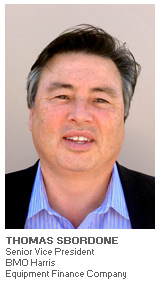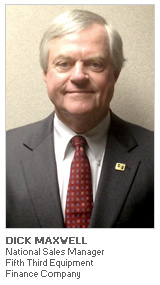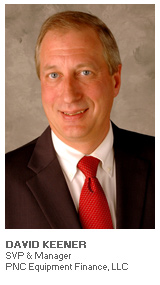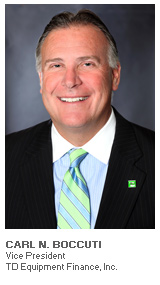 Poised to Win: Adapting to an Ever Changing Environment
Poised to Win: Adapting to an Ever Changing Environment
By: Stuart P. Papavassiliou
Date: Oct 21, 2013 @ 08:00 AM
As equipment leasing professionals convene in Orlando for the Equipment Leasing and Finance Association's Annual Convention, Equipment Finance Advisor asked four sales managers to contemplate this year's convention theme -- Adapt, Innovate, Win.
We spoke with BMO Harris' Tom Sbordone, Fifth Third's Dick Maxwell, PNC's Dave Keener and TD's Carl Boccuti and asked them each to provide specific examples in which their equipment leasing and finance shops had to face certain market realities and create innovative solutions that, in turn, yielded winning results. While the responses were varied, a common theme emerged. Whether its setting aside preconceived notions with regard to a particular client's needs, staffing up in certain verticals or gathering market intelligence, to win these days means to assess the current environment acutely and to adapt accordingly.
We thank Carl, Dave, Dick and Tom for taking on the challenge, adapting to a less traditional set of interview questions and sharing their thoughts on what it takes to succeed in today's environment.
Feel free to read these four perspectives in any order you prefer.
BMO Harris Equipment Finance: Adhering to Time-Tested Principles
Tom Sbordone says BMO is poised to win in today's hyper-competitive market by adhering to, among other things, its mantra of putting the client's interests first.
Equipment Finance Advisor: Within your institution’s equipment leasing and finance operation, what was the single most prevalent market change or market condition your group had to adapt to over the past 18 months?
Thomas Sbordone: BMO Harris Equipment Finance Company (“BMO EFC”) is the Equipment Finance business unit of BMO Harris Bank. The last 18 months have been challenging in the equipment finance space. There has been considerable pricing spread compression, along with a willingness by some lenders to assume additional levels of residual value risk for those assets that Lessors want for building out their portfolios (i.e. rail, marine, corporate aviation, etc.). Fortunately, BMO has both tremendous liquidity and a very favorable cost of funds at its disposal to weather what we hope and expect to be a fairly brief storm period. As one of the largest banks in Canada and one of the largest financial institutions overall in North America, BMO weathered the banking crisis extremely well and is now able to withstand the headwinds lessors now face where there is a wealth of liquidity and fewer credit-worthy opportunities to finance. Our ability to tap into deep existing relationships, not just on the commercial banking side of the BMO house but also through our capital markets and wealth management units, gives us a comfortable seat at the table for the largest and most desirable deals to choose from.

Equipment Finance Advisor: Keeping your answer to the question on having to adapt to current challenges in mind, describe an innovative approach and/or strategy your institution developed to address this market condition or market change.
Sbordone: Our approach is to be nimble, responsive and in position to execute on our strategy in collaboration with our wide variety of partners throughout BMO Financial Group. In addition to placing EFC representatives in many strategic markets, we have also begun building out “verticals” to offer the specialized services and attention that will allow us to differentiate on things other than price. A year ago, we staffed our corporate aviation “vertical”, under the leadership of industry veteran Joe DiLallo, and our successes in just the past 12 months have greatly exceeded our expectations. We see numerous other potential markets to tap into with the creation of a vertical market but we will not abandon our “local servicing” approach by excluding our in-field representation. We feel that the best approach is team collaboration between the client and the BMO team which includes an RM, an in-field EFC general representative, vertical specialist and others as needed. Our strategy in EFC mirrors that of BMO Harris Bank who has created specialty lending groups focused on providing targeted expertise in a variety of sectors, including food and consumer, engineering and construction, financial institutions, corporate finance (i.e. ABL, Sponsor Finance, etc.), healthcare and franchise finance.
Equipment Finance Advisor: How did this newly developed and/or innovative strategy help your group win new business?
Sbordone: BMO is poised to win in the current hyper-competitive market by adhering to its longstanding mantra of putting the client’s interests first, while garnering increased market share by blanketing the market with service providers that add tremendous value. At the highest levels of the institution we have adopted very aggressive goals for new customers through our retail operations, commercial banking products, capital markets and investment advisory businesses, private client group businesses and so forth. BMO is “all in” and committed to growth in the U.S. that is profitable, accretive, value-added, and within the constraints of our time-tested credit and risk profile. BMO has been serving clients for so long and in so many different ways that a loyalty has been built up that carries us through any period of market turbulence.
BMO will continue to monitor closely all developments relative to pricing, contract terms and conditions, servicing to ensure that our products are competitive and well-received by the marketplace. We will continually calibrate our return (ROE) metrics to make sure that we are being fairly compensated for the risks we are assuming. In the end, our clients and our shareholders will benefit by our strong management and adherence to time-tested principles.
Fifth Third Equipment Finance: A Strategy Based on Keen Listening
Fifth Third’s Dick Maxwell notes winning is not about pushing products … it’s about being a good listener and providing consultative solutions.
Equipment Finance Advisor: Within your institution, what was the single most prevalent market change or market condition your group had to adapt to over the past 18 months?
Dick Maxwell: The most prevalent market change we have faced since early 2012 is quite simple – there are not enough new opportunities to propose on. No matter what industry we are talking about, when the RFPs are received, we know there will be five to seven of our peers on the transaction. My favorite saying has become “seven dogs on each bone.”
Equipment Finance Advisor: Keeping your answer to the question on having to adapt to current challenges in mind, describe an innovative approach and/or strategy your institution developed to address this market condition or market change.

Maxwell: Our strategy is simple – listen to the customer’s needs by asking quality questions pertaining to their specific industry. Questions such as “What are your current problems facing you today and in the future?” Then we set about developing as much information, positive or negative, so we can offer a consultative solution. Our marketing reps have to be better listeners and truly pay attention to the needs and goals of their customers. It means coming into a meeting without preconceived notions about what a customer might need. Many times this strategy allows us to provide alternative concepts and to become the trusted advisor; thus, taking the discussion away from solely pricing. We are committed to helping customers achieve goals rather than pushing products. Our consultative sales approach, for example, might mean structuring accelerated principal payments in the early stage of the term loan, so the loan to collateral value mirrors the true value of the asset being financed. This structure could pertain to corporate aircraft as well as to other assets affected by the 2008 downturn. Many aircraft financed over the last five- to seven-years have current loan balances in excess of the aircrafts current fair market value.
Equipment Finance Advisor: How did this newly developed and/or innovative strategy help your group win new business and how will it be further developed as market conditions continue to evolve and change?
Maxwell: We are driving true value and building trusted relationships, but this process is a continuing effort with our team. This process encompasses not just our marketing personnel but includes the documentation, equipment management and syndication teams. It’s particularly rewarding when a customer takes the time and sends a thank you note expressing their satisfaction to our entire team in completing the lease/loan process in a professional and seamless manner.
This strategy will continue to evolve, and with our management team consistently reinforcing this vision our growth in the Equipment Finance industry will prosper by adding new clients and adding other bank products with existing clients.
PNC Equipment Finance: A Value-Added Approach
Dave Keener at PNCEF explains success lies in understanding the evolving market issues, the potential impact to customers and then providing a value added solution.
Equipment Finance Advisor: Within your institution’s equipment leasing and finance operation, what was the single most prevalent market change or market condition your group had to adapt to over the past 18 months?

David Keener: If I had to sum it up, I would say they would be the increased market competition and significant downward pressure on pricing, increased residuals and lessee favorable documentation.
Equipment Finance Advisor: Keeping your answer to the question on adapting to current challenges in mind, describe an innovative approach and/or strategy your institution developed to address this market condition or market change.
Keener: Our primary strategy is to develop new opportunities by bringing ideas to customers. The goal is to provide ideas and solutions to our customers that allow us to win transactions based on value add rather than on price or residual. This means understanding the company and issues it may be dealing with and presenting solutions to the customer. For example, a tax lease may make sense to a customer in a Net Operating Loss position where as a capital lease may help an insurance company manage its non-admitted assets. Large fleet programs may require specialized administrative requirements. Taking time to review a customer’s financials and fully understand their business prior to a customer meeting is our approach to identify issues a company may be managing and to allow for a more productive meeting.
Equipment Finance Advisor: How did this newly developed and/or innovative strategy help your group win new business and how will it be further developed as market conditions continue to evolve and change?
Keener: By bringing solutions to our customers, such as managing large transactions, tax management or accounting solutions, we have been able to provide customers with a value added solution. In some cases, this helps us to avoid the typical RFP process because it’s our solution that the customer wants. Often times this allows us to structure a transaction that is a win for both the customer and PNCEF. This is also a great way for establishing long-term relationships with those customers.
The success of this strategy requires that sales personnel within PNC Equipment Finance understand evolving market issues and how those issues impact our customers. For example, it is important that our sales people understand the status of FAS 13, can discuss NOLs and AMT and other accounting/tax issues a customer may have. It is also important to provide quality support services. The ability of the support staff to provide the customer with its administrative requirements in an efficient and professional manner is another way that PNC Equipment Finance differentiates itself from competitors. I think that our best sales tool is a well-versed sales and support staff that can educate the customer and deliver results as promised.
TD Equipment Finance: Increased Market Intelligence Leads to Strategic Wins
Carl Boccuti says gathering market intelligence and employing a bank-wide team approach have been elemental to TDEF’s success in winning strategic deals.
Equipment Finance Advisor: Within your institution’s equipment leasing and finance operation, what was the single most prevalent market change or market condition your group had to adapt to over the past 18 months?

Carl Boccuti: The single most prevalent market condition that TD Equipment Finance has had to adapt to in the last 18 months has been compressed pricing, especially in the middle-market and large-corporate spaces. Spreads for large transactions have decreased to the thinnest levels ever. One of the primary reasons for this occurring is the slow recovery from the Great Recession. Because of the lack of activity in terms of equipment acquisition, many lenders have had to fight for every deal to keep their balance sheets growing. Additionally, a flight to quality in lending criteria has continued. Many larger companies are still hoarding cash and sitting on the sidelines awaiting a clear indicator of a more robust economy. Due to continued problems in Washington and a lack of bipartisanship, many companies fear another recession could be looming around the corner. These forces have created a dilemma for many mid- to large-ticket lenders in our industry. Pricing discipline has been difficult to maintain while pressure to grow assets continues. Retaining existing relationships has become so valuable that pricing at almost any cost is required. Additionally, larger credit hold positions are being taken by many lenders just to make sure the competition doesn’t get a foot in the door.
Equipment Finance Advisor: Keeping your answer to the question on having to adapt to current challenges in mind, describe an innovative approach and/or strategy your institution developed to address this market condition or market change.
Bocutti: TD Equipment Finance has developed a new pricing strategy that involves gathering of market intelligence, including data from our capital markets function, to better understand the competition. We also developed relationship pricing for strategic accounts. The increased market intelligence led us to a better understanding of what TDEF’s competitive advantages are. We then would tailor our proposal to offer more flexible or alternative structures that sometimes were a better fit for the customer. The new process also led to quicker and better decision making using a team approach. Speed to market is critical in this environment. Additionally, we utilized the market intelligence gathered to challenge our internal treasury function in how they determined and allocated our cost of funds. Finally, we also looked to cut transaction expenses by negotiating better prices for attorney and appraisal costs and we streamlined our documentation process.
Along with the pricing strategy we also developed a team cross sell approach with our bankers. Our goal was to offer as many other bank products as possible through a cohesive product pitch. Included in our pitch was a constant reminder of the superior level of service that would be dedicated to our customer. This approach sometimes allowed us to receive additional consideration from customers even if our pricing was a little higher.
Equipment Finance Advisor: How did this newly developed and/or innovative strategy help your group win new business and how will it be further developed as market conditions continue to evolve and change?
Boccuti: Because of our new pricing strategy, we were able to selectively choose strategic wins. The more intelligence we had, the more successful we were in bidding at the right price. Other times we were able to win on other bank products, which could lead to future opportunities for us on the equipment finance side.
We will continue to utilize this approach going forward. As market conditions change and spreads increase, we should be in a better position to adjust accordingly because of this new pricing discipline. We hope to continue to add new customers and retain existing ones. Additionally, by continuing to offer other bank products, we can develop deeper relationships with our customers.